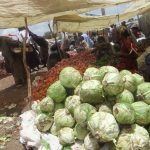IFPRI Discussion Paper by Hosaena Ghebru and Fikirte Girmachew. Abstract: The study investigates the overall impacts of a second level land certification (SLLC) program in Ethiopia using a three-wave panel data set 3092 households collected in 2013, 2015 and 2018. The fact that the first-round survey was administered just before the SLLC program was launched […]
Value chains for nutritious food: Analysis of the egg value chain in the Tigray region of Ethiopia
ESSP Working Paper 152 by Kalle Hirvonen, Kaleab Baye, Derek Headey, and John Hoddinott. Abstract: Eggs have high potential for improving nutrition outcomes in low-income countries, yet very few children in such settings consume eggs on a regular basis despite widespread poultry ownership. To redress this disconnect, a number of interventions have been implemented to improve […]
Food consumption and food security during the COVID-19 pandemic in Addis Ababa
IFPRI Discussion Paper by Alan de Brauw, Kalle Hirvonen, and Gashaw T. Abate. Abstract: International humanitarian organizations have expressed substantial concern about the potential for increases in food insecurity resulting from the COVID-19 pandemic. In this paper, we use a unique panel survey of a representative distribution of households in Addis Ababa to study both […]
Economic impacts of COVID-19 pandemic in Ethiopia: A review of phone survey evidence
ESSP Working Paper 151, by Kalle Hirvonen. Abstract: As in most low and middle-income countries, the paucity of timely economic data in Ethiopia makes it difficult to understand the economic impacts of the COVID-19 pandemic. To mitigate this, several organizations have launched phone surveys to gather more information about the crisis. This research report reviews […]
Food marketing margins during the COVID-19 pandemic: Evidence from vegetables in Ethiopia
ESSP Working Paper 150, by Kalle Hirvonen, Belay Mohammed, Bart Minten, Seneshaw Tamru. Abstract: It is widely feared that the COVID-19 pandemic will lead to a significant worsening of the food security situation in low and middle-income countries. One reason for this is the disruption of food marketing systems and subsequent changes in farm and […]
- « Previous Page
- 1
- 2
- 3
- 4
- …
- 31
- Next Page »




